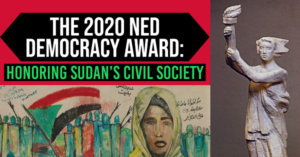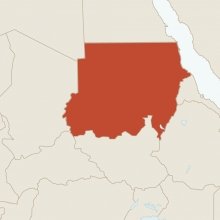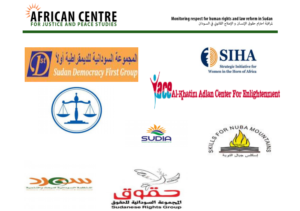 Sudanese security forces violently broke up a protest camp in the war-scarred Darfur region, killing at least protester and wounding a dozen others, including four children, activists said Monday. Authorities said the violence in the town of Kutum erupted late Sunday when a government convoy came under attack after a meeting between security officials and the protesters to discuss their demands, AP reports:
Sudanese security forces violently broke up a protest camp in the war-scarred Darfur region, killing at least protester and wounding a dozen others, including four children, activists said Monday. Authorities said the violence in the town of Kutum erupted late Sunday when a government convoy came under attack after a meeting between security officials and the protesters to discuss their demands, AP reports:
Sudan’s transitional government is struggling to end decades-long rebellions in different areas of the country, including Darfur. Longtime leader Omar al-Bashir, who was overthrown in a popular uprising in April 2019, faces international charges of genocide and crimes against humanity over a scorched-earth campaign against rebels in Darfur in the 2000s.

NDI
After more than 30 years of Islamist rule, Sudan has outlined wide-reaching reforms including allowing non-Muslims to drink alcohol, and scrapping the apostasy law and public flogging. A raft of new laws were passed last week but this is the first public explanation of their contents, the BBC reports:
Sudan has also banned female genital mutilation (FGM). Under the new laws, women no longer need permission from a male relative to travel with their children. The current government is an uneasy mixture of those groups which ousted Mr Bashir and his former allies in the military, who ultimately staged a coup against him….
“We [will] drop all the laws violating the human rights in Sudan,” Justice Minister Nasredeen Abdulbari said. Non-Muslims could still be punished if they are caught drinking with Muslims, the Sudan Tribune reports him as saying.
 Sudan’s political transition remains delicate, buffeted by economic headwinds and restrictions necessitated by the coronavirus pandemic, and concerns of a coup have swirled in recent months, The Times adds:
Sudan’s political transition remains delicate, buffeted by economic headwinds and restrictions necessitated by the coronavirus pandemic, and concerns of a coup have swirled in recent months, The Times adds:
Observers said on Monday that the scrapping of the laws should be read within the broader context of Sudan turning a new page and promoting a more inclusive and representative society. But more would need to be done if the government were to change long-held cultural practices, said Ahmed Soliman, a research fellow at the Africa Program at the British foreign-policy research institute Chatham House.
“The transitional government has demonstrated its intent to keep equal citizenship at the forefront of the political transition, including by addressing issues of gender and religious freedoms,” Mr. Soliman said, adding: “There is also division about these reforms, with a strong backlash by conservative religious and political figures who see the changes as an attack on Islam and morality.”
The National Endowment for Democracy (NED) will pay tribute to the people of Sudan and their historic 2019 revolution when it honors three organizations working tirelessly to strengthen civil society with the 2020 Democracy Award. The three organizations represent the key populations engaged in the protests: young people, women, and those living in the countryside on the periphery.
 “The 2020 Democracy Award honors three groups who have been working for years to ensure the rights of all Sudanese people are protected, to build a new generation of democratic leaders, and to shape a democratic future for Sudan,” said NED president Carl Gershman. “It is NED’s hope that this award will build solidarity for the people of Sudan in their historic struggle for inclusive democracy, human rights, and lasting peace.”
“The 2020 Democracy Award honors three groups who have been working for years to ensure the rights of all Sudanese people are protected, to build a new generation of democratic leaders, and to shape a democratic future for Sudan,” said NED president Carl Gershman. “It is NED’s hope that this award will build solidarity for the people of Sudan in their historic struggle for inclusive democracy, human rights, and lasting peace.”
Wednesday, July 22, 2020
9:30 a.m.-12:00 p.m.
awarding
Regional Centre for Development and Training
Nuba Women for Education and Development Association
Darfur Bar Association
featuring
Remarks from Sudanese Prime Minister Abdalla Hamdok
Conversation with Sudanese Justice Minister Nasredeen Abdulbari and Ambassador Linda Thomas-Greenfield
Presentation of the 2020 Democracy Award featuring remarks by members of Congress
Conversation and Q&A with Democracy Award Recipients moderated by PBS Newshour’s Nick Schifrin







